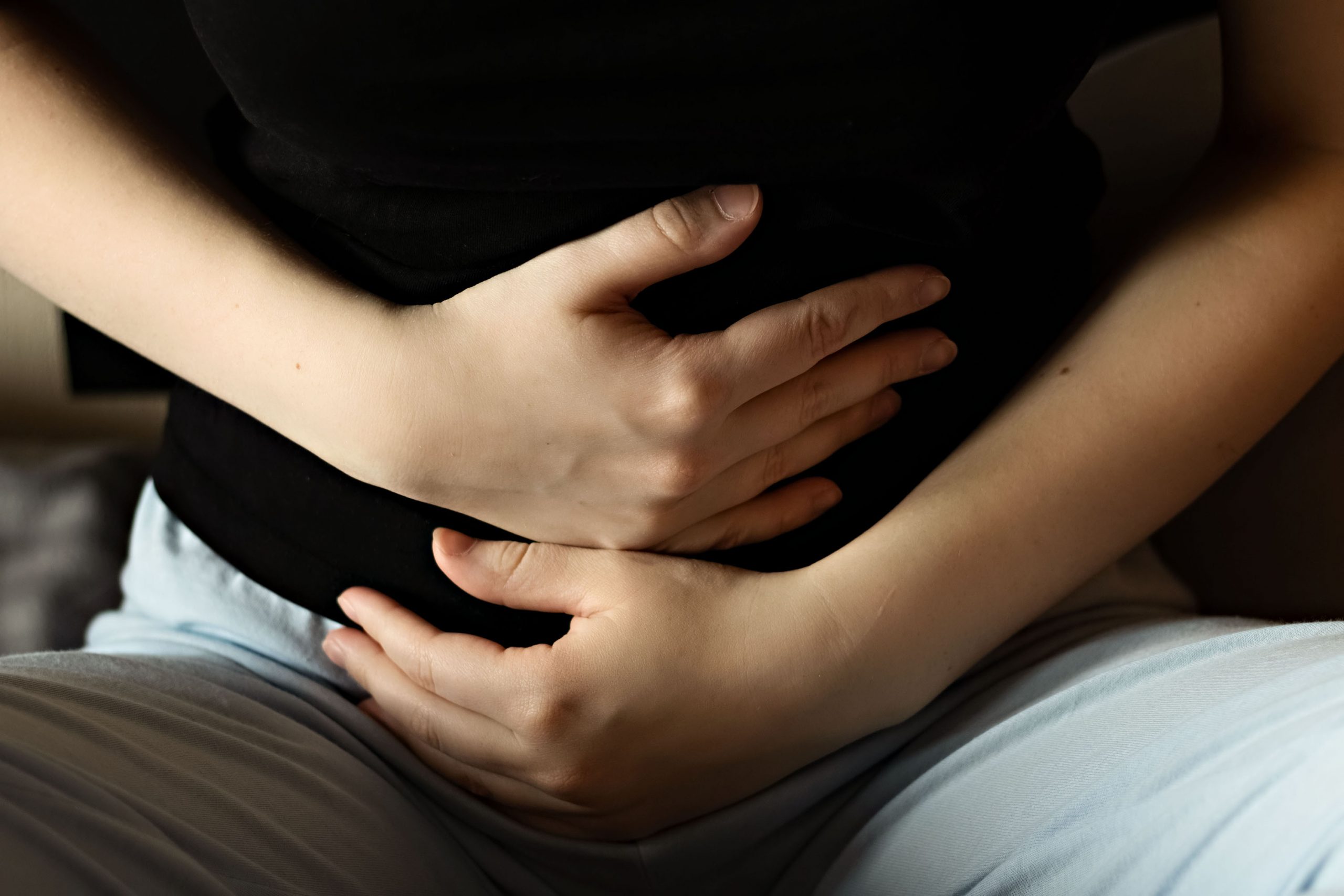Ectopic pregnancy symptoms: signs, treatments and support
Ectopic pregnancy symptoms can be confusing - learn to spot the warning signs


- Ectopic pregnancy symptoms
- What causes an ectopic pregnancy?
- Ectopic pregnancy risk factors include:
- Can a baby survive an ectopic pregnancy?
- When does ectopic pregnancy pain start?
- Diagnosing an ectopic pregnancy
- Ectopic pregnancy treatments
- Medical management
- Surgical management of ectopic pregnancy
- Will an ectopic pregnancy reduce my chances of getting pregnant?
- Can you have a normal pregnancy after an ectopic pregnancy?
- Support after an ectopic pregnancy
Ectopic pregnancy is defined as a pregnancy that forms outside the uterus - usually within the fallopian tubes. It can be dangerous for the mother and will always result in miscarriage.
This is because the embryo in an ectopic pregnancy cannot survive where it has been implanted. Signs and symptoms of ectopic pregnancy vary but are usually detected when a woman experiences uterine pain in the earliest weeks of pregnancy.
Gynaecologist Dr Chantal Simonis of the TFP Fertility Clinic tells us; “Ectopic pregnancies are rare but can be very dangerous, so we need to be very cautious about checking for them. They can cause rupture of the fallopian tubes, which is a life-threatening emergency. Women who have missed a period or have a positive pregnancy test as well as pain and/or bleeding should be evaluated for ectopic pregnancy by a specialist in early pregnancy”.
Ectopic pregnancy symptoms
- Pain or discomfort in the pelvic area (usually on one side)
- Feeling nauseous or being sick,
- Faintness, dizziness, lightheadedness
- Some vaginal bleeding
- Pain in the shoulder tip area, caused by internal bleeding that “refers” the pain to the area around the shoulder blade on one side
Less common symptoms can include:
- Diarrhoea or pain when you urinate or have a bowel movement
- An uncomfortable feeling when you lie down - like you’re very full in the abdomen. This is more common if you’ve already been pregnant before.
- Some back pain
However, ectopic pregnancy symptoms differ and some women won’t be aware they are even pregnant when an ectopic pregnancy is discovered. Dangerous ectopic pregnancy symptoms can develop very quickly. If an ectopic pregnancy has implanted inside your fallopian tube (98% of ectopic pregnancies), it can rupture the tube and cause internal bleeding. This is a life-threatening emergency and will need immediate medical assistance.
It’s also important to note that an estimated 40% of ectopic pregnancies go undiagnosed at first examination. So if you are worried and don’t feel your symptoms are being taken seriously enough, push for a second opinion.
Dr. Chantal Simonis, adds, "Someone who is having an ectopic pregnancy might feel pain on one or the other side, which is a classic sign. Shoulder pain can also be a sign but it doesn’t occur in every case of ectopic pregnancy. It’s caused by irritation of the peritoneum (the membrane that covers the abdominal lining) and the pain gets “referred” by nerves running up to the shoulder. If you have missed your period or have a positive pregnancy test and you’re experiencing pain, get checked out. It could save your future fertility - and even your life.”
Parenting advice, hot topics, best buys and family finance tips delivered straight to your inbox.
A post shared by Student Midwife Studygram (@student_midwife_studygram)
A photo posted by on
What causes an ectopic pregnancy?
It’s not always clear why some pregnancies don’t implant where they should (in the uterus) and 15–20 percent of ectopic pregnancies happen in women with no obvious risk factors.
Ectopic pregnancy risk factors include:
- Fertility treatment - research indicates IVF raises the risk of ectopic pregnancy by 2-5 per cent)
- Previous or current Pelvic Inflammatory disease - according to a study of more than 30,000 women
- Chlamydia - according to the University of Edinburgh)
- Previous ectopic pregnancy - which increases your risk by 10%
- Smoking - one study found that nicotine alters the microenvironment of the fallopian tubes
- Being over 35 - as you get older you're at greater risk, due to the reduced function of the fallopian tubes, Yeko et al)
- A history of previous gynaecological problems - like endometriosis or damage to the fallopian tubes
- Previous caesarean - scarring within the uterus, accounts for 6% of ectopic pregnancies in women with previous caesarean scars.
Can a baby survive an ectopic pregnancy?
Unfortunately, there is no way to save an ectopic pregnancy. It will always need to end in the loss of the pregnancy. That’s because the early embryo does not have the space or the right environment to develop and thrive where it is located. Only embryos that implant in the uterus can survive. If an ectopic pregnancy goes undetected, it can cause serious problems for the mother.
Complications of undetected ectopic pregnancy include:
- Rupture of a fallopian tube
- Need for fallopian tube removal (surgically)
- Hysterectomy (removal of the uterus)
- Severe internal bleeding
- Blood transfusion
- In rare cases, death of the mother
In the UK, ectopic pregnancy is the leading cause of death in the first trimester of pregnancy, but it is still an incredibly rare occurrence. The Ectopic Pregnancy Trust says that around two women a year die from an ectopic pregnancy and around 12,000 ectopic pregnancies occur every year.
When does ectopic pregnancy pain start?
In the majority of ectopic pregnancies, the pain will start early, around 4-8 weeks after your last period. Early detection is key before it causes serious complications. When an ectopic pregnancy is not within the fallopian tubes, the pain can start later.
Diagnosing an ectopic pregnancy
Diagnosis of ectopic pregnancy can only be done by experienced medical professionals, using a combined testing system of ultrasound and blood tests. Sometimes, when your symptoms do not prove ectopic pregnancy, but it is still suspected, surgical assessment might be necessary.
Obstetrician and Gynaecologist Dr Chantal Simonis, explains: “In a pregnancy less than 6 weeks after the last period, sometimes the sonographer cannot detect such a tiny sac. This is especially difficult if a heartbeat has not yet developed. So we also use blood tests done 48 hours apart. This can show us the levels of the HCG hormone in your blood and we will compare those numbers with normal pregnancy hormone levels. It’s about building a complex picture of your symptoms, ultrasound pictures, and blood test results.”
HCG Levels
Ectopic pregnancy can be detected through blood tests, when used in conjunction with ultrasound scans. Two blood tests, to analyse the level of HCG (the pregnancy hormone) should be done 48 hours apart.
Your HCG levels might also be monitored after a natural miscarriage caused by an ectopic pregnancy, to make sure that your body is returning to normal hormone levels.
Ultrasound scan
Pregnancy ultrasounds, using high-frequency sound waves, allow us to look inside the body. They’re a complex technology used by highly trained radiographers and sonographers to detect ectopic pregnancy. Normal pregnancies are usually easily identified as sacs within the uterine cavity.
Transvaginal ultrasounds
If you have a scan to identify ectopic pregnancy, you will usually be asked to consent to a transvaginal ("through the vagina") scan. This means the probe, shaped for the interior of the vagina, will be used to look closely at your uterus, ovaries, and fallopian tube. It will be covered by a medical-grade plastic sheath (sometimes a condom is used) for hygiene. You will have the opportunity to change somewhere private and cover your pubic area with a sheet for your privacy. They will usually invite another healthcare professional into the room to act as a chaperone. It might be uncomfortable or feel strange, but it should not hurt.
Abdominal scans, which are the ones most commonly associated with pregnancy, may not be precise enough to detect such an early scan. If you have a transvaginal scan, you may be asked to empty your bladder beforehand to make it easier for the sonographer to see. A full bladder obscures their view using transvaginal scans, whereas a full bladder for an abdominal scan is helpful.
Source: StatPearls Medical database
Consent - it’s up to you! Please note that you do not have to consent to a transvaginal scan. It is up to you and an abdominal scan can be performed. The team looking after you will explain everything and understand if a transvaginal scan might cause you distress for any reason. You can also “withdraw consent” at any time during the ultrasound and say that you want it to stop.
Laparascopy (surgery)
In rare cases, if HCG blood tests combined with ultrasound tests are inconclusive, surgery may be recommended. This is unusual as the majority of ectopic pregnancies can be detected without laparoscopic (keyhole) surgery.
Ectopic pregnancy treatments
Treatment is not always necessary for ectopic pregnancies and many are only discovered when they have triggered a natural (i.e. non-medical or surgically prompted) miscarriage.
Depending on your symptoms and your wellness when you are seen by a doctor, you might be able to let the miscarriage happen naturally. In other cases, however, medical intervention might be recommended or necessary.
Obstetrician and Gynecologist, Dr Chantal Simonis, explains: “If it’s safe to do so, a doctor will offer “conservative” management, which is letting your body miscarry naturally. We’ll monitor your hormone levels to see if they’ve dropped how they should. However, that’s not always the best option. If you present to a doctor and you’re very ill, we will act to do what we can to save your future fertility. Of course, in very severe cases, we will just focus on doing what we can to save your life. We’ll always look to preserve fallopian tubes where we can, but sometimes it’s necessary to remove one. This happens if there’s been severe damage from rupture. In most cases, we can save the tube and you will recover (physically) within a few days.”
Medical management
Medical management involves taking drugs to make your body miscarry. The most common drug used for this purpose is called methotrexate. This drug, which is also used in cancer treatment, stops your body from producing the enzymes that continue a pregnancy. It also stops rupture and stops the cells from growing. That will result in your body miscarrying the pregnancy. A few hours to days after taking this drug, you will start to bleed and miscarry.
Side effects of medical management for ectopic pregnancy (methotrexate):
- Feeling sick or being sick
- Fatigue
- Sensitivity to light
- Minor skin rash
- Mouth ulcers
- Decreased appetite
- Diarrhoea
Blood tests will be performed a week after you take methotrexate to check your liver function is normal.
(Source: British National Formulary)
If you are currently breastfeeding and given methotrexate, you may be advised to stop. However, information from the pharmacists at the Breastfeeding Network suggests that it’s safe to continue breastfeeding 24 hours after you take methotrexate.
Most women who are diagnosed with ectopic pregnancy and who are not already miscarrying will be offered medical management, to stop rupture from occurring. Methotrexate is 95% effective to end an ectopic pregnancy, so there is a small chance it might not work. In these cases, you will need surgical management.
Surgical management of ectopic pregnancy
If you are very unwell, experiencing severe bleeding or it is suspected (or confirmed) your fallopian tube has ruptured, surgery is likely your safest option. There are two different types of surgical options:
- Salpingostomy, which leaves your tube intact and removes the pregnancy
- Salpingectomy, which removes the tube and the pregnancy
The surgery that’s right for you won’t be obvious until your surgeon is able to see the extent of the damage that has been done by the ectopic pregnancy. In most cases, surgeons will try as best they can to avoid salpingectomy, as it’s best for you to keep both your fallopian tubes if possible. Once you are awake from the anaesthesia, your surgeon will explain what happened during surgery and the reasons for their decisions. They will also be able to tell you what this means for your future fertility.
Minor complications occur in 1% of those who undergo surgical management of ectopic pregnancy and include:
- Infection after surgery
- Wound infection, bleeding or discomfort around your incisions
- Nausea and vomiting
Major complications are less common (1 in 1000) and include:
- Not being able to find the ectopic pregnancy
- Damage to your internal organs (bladder, bowel)
- Nerve damage
Source: NHS patient information
Will an ectopic pregnancy reduce my chances of getting pregnant?
If you have had surgical management of a previous ectopic pregnancy that meant your tube was removed (salpingectomy) then it has commonly been believed that this can reduce your chances of getting pregnant. However, research comparing removal of the tube and saving the tube (salpingotomy) in 446 women has shown this not to be the case.
Another, larger study of 1,229 women came to the same conclusion; that the outcomes for both procedures were broadly the same.
Once you have had one ectopic pregnancy, you are at a 10 percent increased risk for another. However, this means that 90% of pregnancies after ectopic pregnancy will be normal and healthy, this is according to the Miscarriage Association.
Conceiving after medical management
If you are given methotrexate to manage ectopic pregnancy, you are advised to wait three months before trying to conceive again. This is because it can affect future pregnancies if you do not wait and conceive too early. It also depletes your body of folic acid, which is essential for preventing birth defects.
Can you have a normal pregnancy after an ectopic pregnancy?
Absolutely, you can go on to have a healthy and normal pregnancy after an ectopic pregnancy. Once you have conceived again after a previous ectopic pregnancy, you will be recommended to have an early scan (around 7 weeks) to check the location of your pregnancy
There is no evidence that a previous ectopic pregnancy will have any effect on the development of your next pregnancy. It will not affect your birth options or plans, either.
Source: Miscarriage Association, Ectopic Pregnancy
Support after an ectopic pregnancy
Dealing with the grief of an ectopic pregnancy can be difficult, whether it was a planned pregnancy or not. Your feelings of grief and loss are valid - losing a pregnancy at an early stage is no less painful than one at a later stage. You may feel confused and have some complex feelings around the treatment and what happened before your diagnosis.
Whatever you feel is normal and everyone deals with grief differently. Anger is common; wondering why this has happened to you and whether you could have done something to prevent it. Miscarriage is very cruel and it can have lasting psychological effects on you and your partner. You may also find that other people’s responses to your grief are difficult to deal with too, if you choose to tell people what has happened.
There is support available, in the form of peer support groups, counselling and information from charities:
- These include the Miscarriage Association.
- One popular podcast, “The Worst Girl Gang Ever” has been helpful for many who have miscarried. Accessing a community of people who know exactly how you feel can really help you cope.
- If you are struggling with your mental health, speak to your GP. They can sometimes help with medication. You can also refer yourself for psychological therapy through the NHS.
Dr Simonis says that grief from an ectopic pregnancy is sometimes different from other miscarriages and not well understood by others. She says “People underestimate the grief that accompanies ectopic pregnancy because the baby will never be viable (compatible with life). For some couples who experience an ectopic pregnancy, it feels somehow worse because of the nature of the pregnancy. They’ve sometimes had to trigger a miscarriage to save their own life. That can bring up very complex feelings. We need to support people who have suffered these losses and perhaps undergone the trauma of collapse and emergency surgery. It can be a very scary situation.”

Dr Chantal Simonis, a gynaecologist and obstetrician at TFP Fertility Group.

Tannice Hemming has worked alongside her local NHS in Kent and Medway since she became a parent and is now a mum of three. As a Maternity Voices Partnership Chair, she bridged the gap between service users (birthing women and people, plus their families) and clinicians, to co-produce improvements in Maternity care. She has also worked as a breastfeeding peer supporter. After founding the Keep Kent Breastfeeding campaign, she regularly appears on KMTV, giving her views and advice on subjects as varied as vaccinations, infant feeding and current affairs affecting families. Two of her proudest achievements include Co-authoring Health Education England’s E-learning on Trauma Informed Care and the Kent and Medway Bump, Birth and Beyond maternity website.